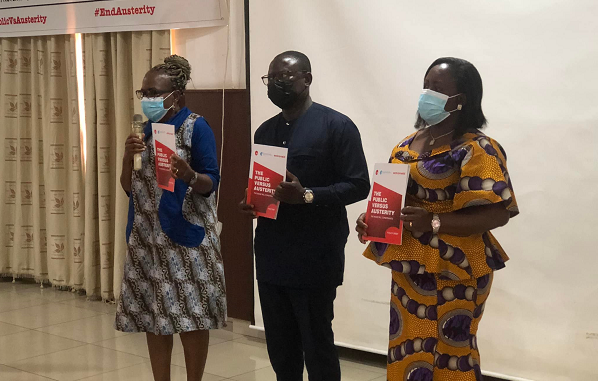
Austerity policies undermining quality public services in Ghana – ActionAid’s report
A new report by ActionAid Ghana, a non-governmental organisation, reveals that although Ghana’s public-sector wage bill has increased significantly over the last decade, the pace of growth has not matched the increasing need for the critical workforce required in the public sector, especially in education and health, thus, severely affecting the delivery of quality public services.
According to the report, the inability of government to absorb more public-sector workers stems from the growing rigidities in the budget as a result of sharp increases in debt service, in particular interest payments.
Advertisement
Titled, “The Public Versus Austerity: The Wage Bill Constraints”, the report analyses trends in public sector wage bill in education and health sectors and freezing or depreciation of wages, and trends of the overall public sector wage bill as a percentage of government budget, revenue or Gross Domestic Product (GDP).
It also examines the links between Ghana’s debt servicing and public sector wage bill and how these are related to the advice of the International Monetary Fund (IMF).
Austerity policies
As part of the IMF sponsored fiscal consolidation programme launched in 2015, the government accepted the key programme conditionality of public sector wage rationalisation policy to contain and reduce the wage bill.
The IMF conditionality included the government implementing a hiring freeze across most government agencies, and the cap on nominal wage increases.
The findings of the report show a situation of rapid increasing public debt amidst declining GDP growth, which further points to an emerging debt crisis in the country.
This situation, the report highlights, has the potential to affect the provision of critical gender-responsive social services such as health, education, social protection, sanitation, and water.
According to the report, the fast-rising public debt and debt servicing costs have constrained government’s fiscal space to expand employment in health and education sectors.
Debt servicing
According to the report, “Ghana is spending 59 percent of its revenue in debt servicing, the second highest in the world,” suggesting that “This must be suspended in the short term to allow for a comprehensive response to COVID-19, and then renegotiated in the medium term to ensure that debt repayments do not compromise the spending on public services needed to create space for recruitment into the public sector and deliver on the Sustainable Development Goals (SDGs).”
It further added that “Action is also needed to push back on IMF policy advice that has pressurised the government in recent years to freeze public sector wage bills, undermining the capacity to employ more teachers (to match the scale of increasing enrolment due to the free education up to the senior high level and pre-primary expansion), doctors, nurses, care workers (to respond to COVID-19) and other essential frontline staff.”
It said the “Percentage of government revenue being spent on debt servicing (above 40 percent between 2016 and 2019 and over 55 percent in 2020), far exceeds the IMF’s sustainable threshold of 12 percent and the 18 percent IMF’s country-specific limit for Ghana.”
The report adds, “This alarming situation has constricted government’s fiscal space in providing and expanding gender-responsive public social services such as education, health, social protection, water, and sanitation – further deepening the already existing gender inequality and women’s unpaid domestic services such as increased child health and education services, fetching water and sanitation services.”
Unpaid works
The report further indicated that the “COVID-19 crisis has revealed the extent to which public services have been under-funded for a generation across Africa, with women in the poorest communities often having to take the strain to fill the gaps through unpaid care and domestic work.”
The report also added that the impacts of COVID-19 coupled with the increasing women’s unpaid domestic and childcare services, are pushing women more into poverty and undermining their progress on human rights – a situation that significantly threatens the realisation of SDGs.
Quality public service
The Interim Country Director of ActionAid Ghana, Mr John Nkaw, in a speech read on his behalf at the launching of the report, said “ActionAid Ghana’s focus on improved quality public service stems from our Mission Priority four which centres on improving citizen's participation, public accountability, effective mobilisation and fair redistribution of public resources towards.”
He said ActionAid Ghana has over the past 30-years focused its advocacy on education financing systems that promote gender-responsive public education – largely- delivered through equitable allocation of the national budgets.
For him, over the past forty years, austerity policies have led to cuts in the public sector workforce that have undermined the ability of governments to deliver quality public services.
Call to action
Mr Nkaw noted that “Public sector wage constraints undermine human rights, block achievement of Sustainable Development Goals and progress on women’s rights – these deadly measures have left countries ill-prepared for COVID-19 and the climate crisis.”
He has, therefore, called on the government to end austerity policies, saying “We all need one voice to reecho our concerns that now is the time to end austerity – to respond to the inter-connecting crisis of COVID-19, climate, inequality and regression of women’s rights.”



